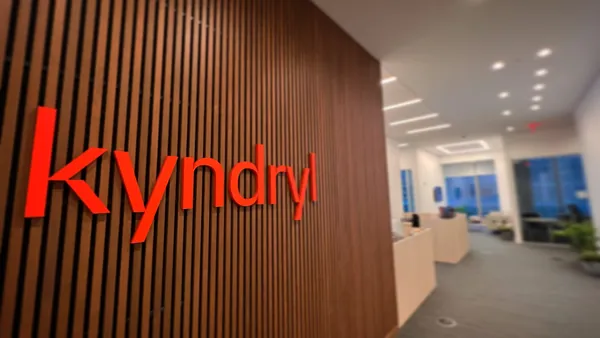Salesforce and Microsoft expanded their partnership Thursday, pushing Salesforce's Marketing Cloud into Azure and ushering in new integrations between Salesforce products and Microsoft Teams.
Though details were immediately released, the deal will bring a considerable workload to Azure, as Salesforce can deliver enterprise clients the size of Marriott and Unilever. The integrations between Salesforce's Sales Cloud and Service Cloud with Microsoft Teams are set to go live by late 2020.
Amid heated competition in the cloud market, Salesforce coming aboard Microsoft is a sign the two companies are partly shifting from competition in the customer relationship management (CRM) space and focusing on areas where clients might benefit from their collaboration.
In the process, both brands raise their profile by leveraging each others customer bases.
"Competition is kind of heating up," said Heikki Nousiainen, CTO and cofounder at Aiven, in an interview with CIO Dive. "All these providers are competing for big logos and can offer deep discounts to try and capture big names."
Increased competition also offers businesses and consumers more options, Nousiainen said.
Microsoft and Salesforce have ties going back to 2014, when the two announced integrations between Microsoft Office and Salesforce's banner customer relationship management (CRM) tool.
Salesforce's move of its Marketing Cloud to Azure marks "a big win" for both companies. It validates the potential of both platforms under a synergistic relationship, said Ed Anderson, distinguished research VP at Gartner, in an interview with CIO Dive.
"In this instance, running Marketing Cloud on Azure does open up another avenue for them to tap into Azure development resources," Anderson said.
The latest expansion of the Microsoft deal was announced one day after another partnership with a top cloud provider. Salesforce joined Amazon Web Services, Genesys and the Linux Foundation to launch the Cloud Information Model, a dueling standard to the Open Data Initiative that Adobe, SAP and Microsoft announced in 2018.
It's unlikely Salesforce's integration announcements will cease, as the company can use its strong position in the CRM market as a valuable bargaining chip.
"You will almost definitely continue to see partnerships like these," said Gordon McKenna, CTO of public cloud at hybrid IT service provider Ensono, in an interview with CIO Dive. "Salesforce is not stopping at AWS and Microsoft."
In order to reap the value from the partnership, both companies must allow the new capabilities to influence the way they approach enterprise customers.
For Salesforce, there's advantage in the broad number of solutions Microsoft brings to market, as digital transformation pressures make customers seek infrastructure, business applications, data analytics, and efficiency solutions.
"Salesforce's strategy is to be a multifaceted provider for lots of different offerings for its customers and for developers," said Anderson.














